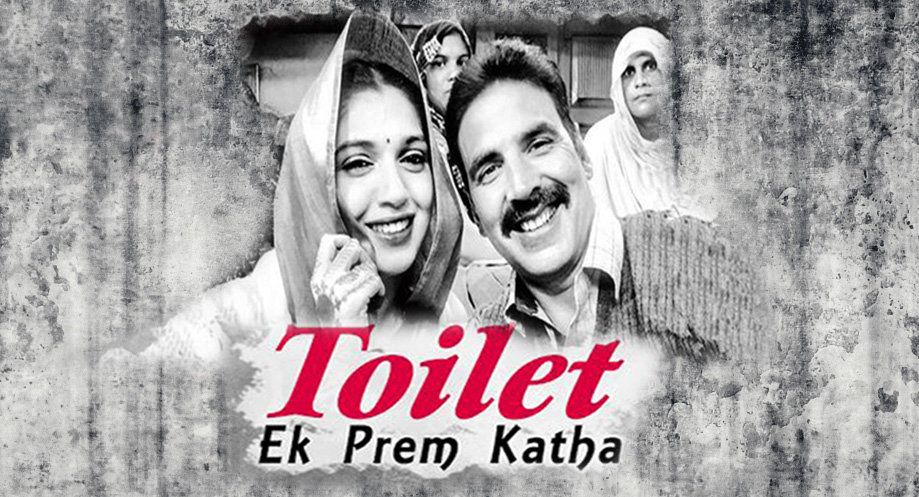
Toilet: Ek Prem Katha – Pure Glorification of the Manusmriti
Toilet: Ek Prem Katha is a movie produced by Reliance Entertainment owned by Mr. Ambani, one of the main corporate sponsors of Prime Minister Narendra Modi. The theme of the movie is fine since toilets are everyone’s need, but the problem occurs when it gives illogical solutions.
In this film, Akshay Kumar plays the character Keshav, a modern Brahmin man who knows the Manusmriti (the law book of Hinduism/Brahminism) by heart. Keshav’s father is also a staunch Brahminical mind, who believes that his son’s marriage to a black buffalo would help improve his fortunes.
Keshav meets Jaya Joshi (Bhumi Pednekar), a Brahmin woman who belongs to a family that believes in Gandhism and the Bhagwad Gita and falls in love with her. He eventually convinces her to marry him, but according to Keshav’s father, Keshav’s horoscope implies that he should only marry a girl who has two thumbs on one of her hands. Since Jaya does not fulfill this requirement, Keshav gets an artificial thumb made and gives it to Jaya, who wears it as a ring on her thumb. Keshav’s unsuspecting father agrees to their marriage.
On her first morning at Keshav’s house, Jaya reluctantly goes to a field to defecate, but comes back agitated without defecating, and complains about it to Keshav. Despite Keshav’s repeated attempts to convince Jaya to give up her stubbornness about needing a toilet, Jaya remains steadfast. He makes a couple of temporary adjustments to solve the problem without actually building a toilet in his house, but after a while, Jaya gets frustrated and leaves him, to live at her parents’ house.
Keshav then attempts to convince the village leaders to build toilets, but they chant Sanskrit mantras from the Manusmriti and proclaim that Manu doesn’t allow it. Keshav chants another mantra in Sanskrit and counters them, that the Manusmriti also commands people to maintain hygiene and cleanliness. So according to Keshav, there is a solution in the Manusmriti.
Later, Keshav, with the help of Jaya, contacts the concerned regulatory authority and starts the construction of a toilet in his front yard. When the construction is finished, Keshav’s father and the village people prepare to demolish the toilet while Keshav is asleep. However, Keshav wakes up on time and protects the toilet from complete demolition.
Jaya is blamed by the other women for all this drama, and is advised to adjust with the Manu-based Brahminical Hindu culture. She then files for a divorce in the local court (in which you can see the image of Dr. Babasaheb Ambedkar hanging on the wall), citing the unavailability of a toilet in her husband’s house as the primary reason for seeking a divorce.
If Manu had written anything about the Dignity of Women, I would love to know.
Anupam Kher (the elder in Jaya’s house) who is seen quoting Gandhi and watching Sunny Leone’s videos, goes to Keshav’s house when the case garners a lot of media attention- to convince his father by citing from the Bhagwad Gita. Later on, politicians and the concerned government departments spring into action and hasten the process of constructing toilets in Keshav’s village. The Health Minister glorifies Gandhi and Narendra Modi’s Swachh Bharat Abhiyan (the project for Clean India).
Keshav’s father remains steadfast on his decision to not have a toilet in his house, until one day, his mother, while going out to defecate, falls on the doorstep, injures her hip and cries vehemently that she can’t possibly walk to the fields to defecate, and that she must use the toilet that Keshav constructed in the front yard. After much reluctance, Keshav’s father gives in and helps his mother to the toilet. He then realizes that a toilet is indeed a critical requirement for a household.
On the day of the hearing of the divorce case of Keshav and Jaya, the Judge gets an official notice from the Chief Minister’s office, urging the Judge to not grant their divorce (hinting that the Judiciary is established by the Constitution of India, but can be misused by brahminized politicians or those in power). It’s a purely Gandhian perspective, that who are in power can do no wrong, and that we have to be loyal to them and follow them blindly,
The Judge doesn’t grant them divorce but gives them the news that construction of toilets in their village shall start from the very next day. The couple comes out together happily. Keshav’s father apologizes to Jaya for his foolish stubbornness. In the end credits, villagers are shown lining up to use mobile toilets outside their village while construction of toilets throughout the village goes on in full swing.
In conclusion, Toilet: Ek Prem Katha movie presents:
* Pure glorification of the Manusmriti, which Dr. Babasaheb Ambedkar burnt long ago on 25th December 1927 – a practice that is being continued by every Phule-Ambedkarite by burning it every year on 25th December.
* A modern Brahminical/Hindu perspective, i.e. the blatant lie that there is liberation for the women of the entire village, through Manusmriti.
* Building the belief that only Gandhism, i.e. Varnasharama Dharma (which is the new Manusmriti) can give new hope, and that Prime Minister Narendra Modi is some sort of a messiah in this regard.
Author – Obed Manwatkar is a volunteer at Truth Seekers International (Satya Shodhak Samaj Antarrashtriya) and a PhD Research Scholar at SHUATS, Allahabad
This article was originally published at Round Table India.




Sir, pls write article regard about Garagaparru (Andhra pradesh) Dalits’ boycott.